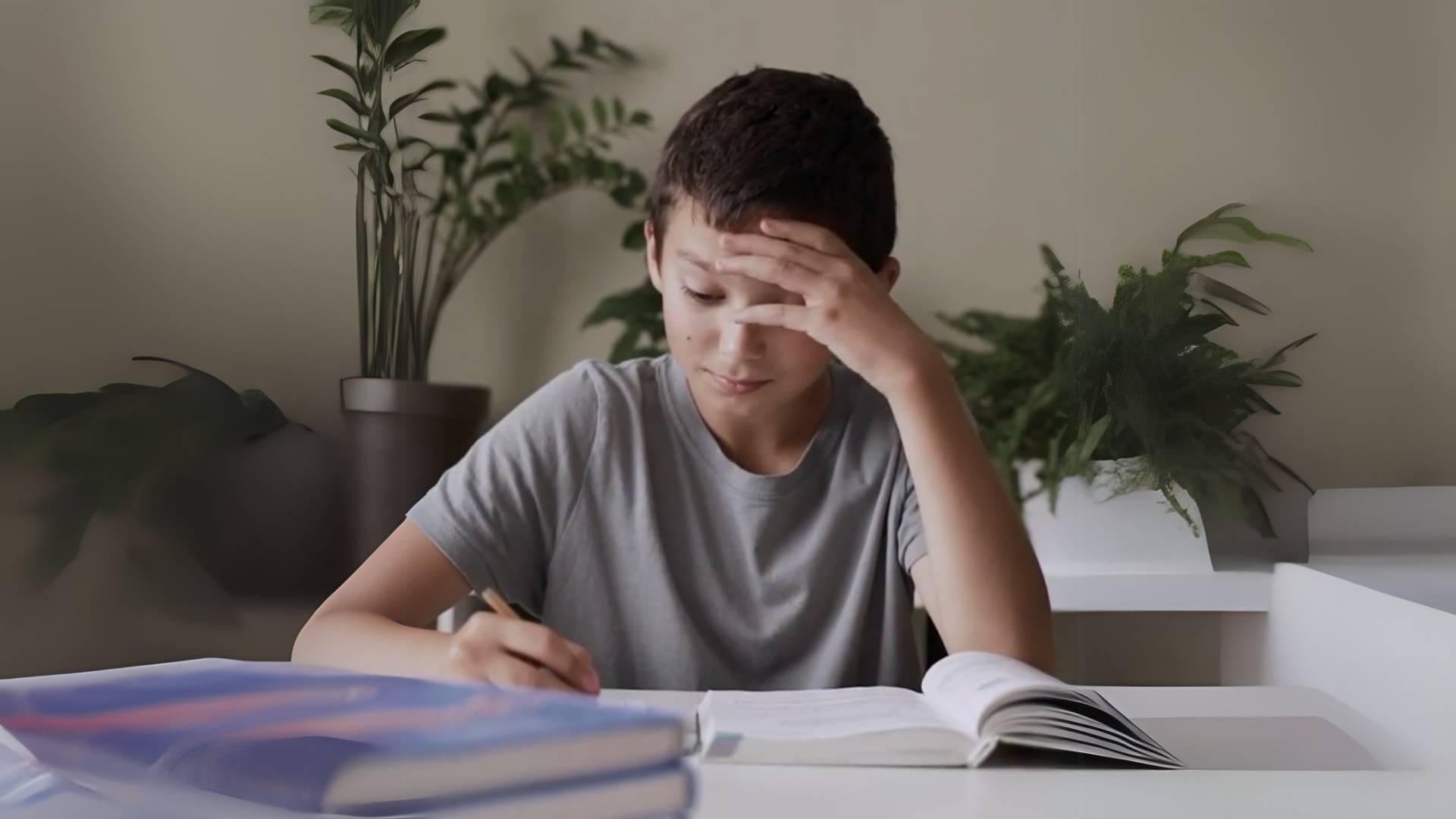Anxiety in school children is an increasingly prevalent concern affecting their emotional well-being, academic performance, and social development. While some levels of anxiety are normal, persistent and excessive anxiety can hinder a child’s ability to thrive in a school environment. Understanding the root causes of anxiety in school children is essential for parents, teachers, and mental health professionals to provide the necessary support and interventions.
Common Causes of Anxiety in School Children
Academic Pressure
One of the leading causes of anxiety in school children is academic pressure. Children are often expected to excel in various subjects, participate in extracurricular activities, and meet high expectations set by teachers and parents. The fear of failure, performance anxiety, and the pressure to achieve high grades can lead to overwhelming stress.
A child struggling with math might develop a fear of failure, leading to avoidance behaviors such as skipping homework or pretending to be sick to miss class. Encouraging a growth mindset, where mistakes are seen as learning opportunities, can help alleviate the pressure children feel. Teachers and parents should focus on effort rather than just results.
Social Challenges and Peer Pressure
School is a social environment where children interact with peers daily. Social anxiety often stems from fear of judgment, rejection, or not fitting in with classmates. Peer pressure to conform to certain behaviors, appearances, or interests can exacerbate feelings of insecurity and stress. A child who struggles to make friends may experience loneliness and anxiety about lunchtime or group activities. Teaching children social skills, encouraging inclusive play, and fostering a supportive classroom environment can help reduce social anxiety.
Bullying and Cyberbullying
Bullying, whether physical, verbal, or cyber, is a major contributor to anxiety in school children. Victims of bullying often feel helpless, fearful, and emotionally distressed. Cyberbullying, which occurs through social media and messaging apps, can be particularly damaging as it follows children beyond school hours. A child receiving hurtful messages online may develop anxiety about attending school or interacting with peers.
Schools should implement strict anti-bullying policies, and parents should monitor their children’s online activities while encouraging open communication about bullying experiences.
Separation Anxiety
Younger children, especially those in preschool and early elementary school, may experience separation anxiety when starting school. This anxiety arises from being away from familiar caregivers and adjusting to a new environment. A child crying and clinging to a parent at school drop-off may be experiencing separation anxiety. Gradual exposure, reassurance, and consistency in routines can help ease the transition for children dealing with separation anxiety.
Learning Disabilities and Special Needs
Children with learning disabilities, ADHD, or other special needs may experience heightened anxiety due to difficulties in understanding lessons, keeping up with peers, or facing stigma. A child with dyslexia struggling with reading aloud in class may fear embarrassment and withdraw socially. Providing individualized learning support, accommodations, and positive reinforcement can help children with learning differences feel more confident and less anxious.
Teacher-Student Relationships
A child’s relationship with their teacher plays a significant role in their emotional well-being at school. A harsh or unsupportive teacher may inadvertently increase a child’s anxiety, while a nurturing and understanding teacher can boost confidence and comfort levels. A child who feels their teacher is intimidating may hesitate to ask for help, leading to increased academic stress. Teachers should adopt a supportive approach, offering encouragement and creating an open-door policy for students to seek help.
Overstimulation and Sensory Sensitivities
Some children, particularly those with sensory processing disorders or autism spectrum disorder (ASD), may feel overwhelmed by loud noises, crowded hallways, or bright lights in the school setting. A child with sensory sensitivity may experience distress during assemblies or lunchtime due to excessive noise. Schools can create quiet spaces, allow sensory breaks, and work with occupational therapists to support children with sensory sensitivities.
Family Issues and Home Environment
Stressors at home, such as parental conflict, divorce, financial struggles, or the loss of a loved one, can contribute to anxiety in school children. Children often bring their worries from home into the classroom, affecting their ability to concentrate and engage. A child whose parents are going through a divorce may exhibit signs of anxiety, such as difficulty sleeping and trouble focusing in class. Providing emotional support, counseling services, and maintaining open communication with children about their feelings can help them cope with family-related stress.
Fear of Public Speaking and Performance Anxiety
Many children experience anxiety when required to speak in front of the class or participate in performances. The fear of making mistakes, being judged, or forgetting their lines can lead to panic and avoidance. A child dreading an oral presentation may experience stomach aches or ask to skip school on the presentation day. Gradual exposure, practice, and positive reinforcement can help children build confidence in public speaking situations.
Media Influence and Global Events
Exposure to distressing news, such as violence, pandemics, or climate change, can contribute to anxiety in school children. The constant influx of negative information through media can make children feel unsafe or overly worried about the world around them. A child who frequently hears about school shootings on the news may develop a fear of attending school. Parents and educators should monitor media exposure, provide age-appropriate explanations, and reassure children about their safety.
Anxiety in school children stems from various factors, including academic pressure, social challenges, bullying, separation anxiety, and external stressors. Identifying the root causes of anxiety allows parents, teachers, and mental health professionals to implement strategies that promote a supportive and anxiety-free learning environment. By fostering resilience, teaching coping mechanisms, and encouraging open communication, children can develop the emotional strength needed to navigate school life with confidence and ease.
How Can Parents Help a Child with School Anxiety?
School-related anxiety can be challenging for both children and their families. Parents play a crucial role in helping children manage their worries and develop coping skills to navigate academic and social challenges. Understanding the signs of anxiety and implementing supportive strategies can make a significant difference in a child’s well-being and confidence at school.
Recognizing the Signs of Anxiety
The first step in helping a child with school anxiety is recognizing the signs. Anxiety can manifest in various ways, including frequent stomach aches or headaches with no medical explanation, avoidance of school or reluctance to participate in activities, sleep disturbances (such as nightmares or difficulty falling asleep), excessive worrying about schoolwork, social interactions, or test performance, and irritability, mood swings, or frequent meltdowns before school.
Creating a Safe and Open Environment
Children need a safe space to express their feelings without fear of judgment. Encourage open communication by validating their emotions rather than dismissing their worries. For instance, saying, “I’ve noticed that you’re feeling a bit different about school lately. I’m here to listen if you want to talk about it” can help the child feel supported.
Establishing a Consistent Routine
Children with anxiety benefit from predictability. A well-structured routine can reduce uncertainty and provide a sense of security. Key aspects of a helpful routine include setting regular wake-up and bedtime schedules, preparing school materials the night before to minimize morning stress, and creating a calming morning routine with time for breakfast and relaxation.
Teaching Coping Techniques
Providing children with tools to manage anxiety can help them feel more in control. Effective coping strategies include deep breathing exercises (e.g., “Let’s take a deep breath in for four seconds, hold for four, and slowly breathe out for six seconds”), visualization techniques (imagining a safe, happy place), and positive self-talk (e.g., “I can handle this” and “I am improving every day”). Mindfulness activities can also help children stay present and calm.
Working with Teachers and School Staff
Collaborating with teachers and school counselors can ensure that children receive the necessary support at school. Parents should communicate concerns with teachers, discuss accommodations such as extended test time or a quiet place to de-stress, and encourage gradual exposure to anxiety-inducing situations, such as speaking in class. Research from the Harvard Graduate School of Education found that classrooms where teachers actively encouraged inquiry and normalized mistakes saw a 60% increase in student participation and problem-solving confidence.
Encouraging Social Interactions
For children who experience social anxiety, developing friendships and positive relationships at school can be beneficial. Parents can help by setting up playdates in comfortable settings, encouraging participation in group activities or clubs aligned with the child’s interests, and teaching social skills and confidence-building exercises.
Limiting Media Exposure and Reassuring Safety
If anxiety stems from external factors like news or social media, parents should monitor the child’s exposure to distressing stories, provide age-appropriate explanations, and reassure them about their safety. This approach helps reduce the impact of negative media and instills a sense of security.
Seeking Professional Support When Needed
If school anxiety becomes overwhelming and begins to interfere with daily life, professional guidance may be necessary. Parents should consider consulting school counselors or psychologists, licensed therapists specializing in childhood anxiety, or pediatricians for advice on managing anxiety-related physical symptoms. Mindfulness-Based Coaching Sessions, such as those offered by Saurabh Gupta at MindfulWholeness.org, can provide personalized strategies to help children build resilience and self-confidence.
Helping a child with school anxiety requires patience, understanding, and a proactive approach. By creating a supportive home environment, teaching coping strategies, and working collaboratively with educators, parents can empower their children to manage anxiety and thrive in school. With the right support, children can build resilience and gain the confidence needed to navigate academic and social challenges successfully.
Perfectionism and Overworking
While some children avoid schoolwork due to anxiety, others may overcompensate by working excessively to avoid failure. This perfectionism often leads to increased stress, burnout, and frustration. Research from the American Psychological Association (APA) has shown that perfectionistic students are at a 30% higher risk of developing anxiety disorders due to the unrealistic academic standards they impose on themselves.
A child rewriting assignments multiple times to achieve perfection may become overwhelmed and frustrated, making schoolwork feel even more stressful and discouraging.
Setting realistic expectations and emphasizing effort over perfection can help children manage anxiety while maintaining a healthy academic balance. Research in the Journal of Child Psychology and Psychiatry suggests that teaching self-compassion and cognitive restructuring techniques can reduce perfectionist tendencies in children by 35%, leading to improved emotional well-being and academic performance.
Fear of Asking for Help
Anxious students may hesitate to ask for clarification or assistance due to fear of appearing incompetent. This reluctance can lead to misunderstandings, frustration, and gaps in learning, further exacerbating academic struggles. According to a University of California, Berkeley study, children with school-related anxiety are 45% less likely to ask for help in the classroom, increasing their likelihood of falling behind academically.
A child afraid of being judged may avoid raising their hand in class, leading to confusion, incomplete assignments, and lower grades. Teachers and parents should create an environment where asking questions is encouraged and rewarded, helping children build confidence in seeking help. A study from the Harvard Graduate School of Education found that classrooms where teachers actively encouraged inquiry saw a 60% increase in student participation and problem-solving confidence.
School anxiety can have a profound impact on a child’s academic success. Identifying the effects of anxiety on learning and providing appropriate support can help children feel more confident and engaged in school. The next section will explore strategies teachers can use to support anxious students and foster a positive learning environment. By understanding physical, emotional, and behavioral symptoms, parents and educators can provide the necessary support to help children manage their anxiety effectively.
A Guide for Parents
School-related anxiety is a common challenge that many children face, whether due to academic pressures, social interactions, or fear of failure. Parents play a vital role in supporting their children through these difficulties, helping them develop emotional resilience and confidence. By fostering open communication, teaching coping techniques, and modeling a positive mindset, parents can provide the foundation for their children to manage school-related stress effectively.
Recognizing the Signs of School-Related Anxiety
Before parents can support their child’s anxiety, they need to recognize its signs. Some children may verbalize their worries, but many express anxiety through physical symptoms or behavioral changes. Frequent complaints of stomach aches, headaches, or trouble sleeping can be indicators of stress.
Other warning signs include reluctance to go to school, emotional outbursts, avoidance of homework, or social withdrawal. Instead of dismissing these symptoms as typical childhood behaviors, parents can acknowledge their child’s struggles by saying, “I’ve noticed that you’re feeling a bit different about school lately. I’m here to listen if you want to talk about it.”
Encouraging Open and Supportive Conversations
A key step in managing school-related anxiety is fostering open communication between parents and children. Anxious children often hesitate to talk about their fears because they worry about being judged or misunderstood. Parents can encourage open dialogue by avoiding direct interrogations like “What’s wrong?” and instead using gentle prompts such as, “I see that school has been a bit tough lately.
Want to talk about what’s on your mind?” It’s essential to validate their feelings rather than dismissing them with phrases like “It’s nothing to worry about.” Instead, parents can reassure their child by saying, “I understand that school can feel overwhelming sometimes. Let’s figure out how we can make things easier together“.
Teaching Children to Reframe Negative Thoughts
Anxious children often engage in negative self-talk, reinforcing their fears and self-doubt. Parents can help shift these thought patterns by guiding their children toward more empowering beliefs. For example, if a child says, “I always fail in math,” parents can help them reframe it by saying, “Math can be tricky, but every mistake you make helps your brain grow stronger.
You’re still learning, and that’s okay.” Similarly, if a child says, “Nobody likes me at school,” parents can offer a new perspective: “You may not have found the right friends yet, but let’s think of ways you can connect with others.” Encouraging positive affirmations, such as “I can handle challenges” and “I am improving every day,” helps children develop a growth mindset and reduces their tendency to catastrophize situations.
Teaching Coping Strategies for Anxiety
When children feel overwhelmed, practical coping techniques can help them manage their emotions in real-time. Parents can introduce simple but effective grounding techniques, such as the 5-4-3-2-1 method, which involves naming:
- 5 things they can see
- 4 things they can touch
- 3 things they can hear
- 2 things they can smell
- 1 thing they can taste
This exercise helps shift their focus from anxious thoughts to the present moment (American Academy of Pediatrics, 2018 ). Another effective tool is deep breathing exercises. Parents can guide their child by saying, “Let’s take a deep breath in for four seconds, hold for four, and slowly breathe out for six seconds. Let’s do this together.” Additionally, parents can introduce visualization techniques, asking their child to picture a happy or safe place, such as the beach or a favorite park, to help them regain a sense of calm.
Creating a Structured and Confidence-Boosting Routine
Many children experience peak anxiety before the school day begins. Establishing a morning confidence ritual can help them start their day with a positive mindset. Parents can integrate simple practices such as playing uplifting music at breakfast, encouraging power postures (standing tall, hands on hips, deep breathing), and practicing positive affirmations like, “I am ready for today. I can handle any challenges that come my way.” When children struggle with schoolwork, breaking assignments into small, achievable steps can help reduce feelings of overwhelm.
Instead of saying, “Just get it done,” parents can say, “Let’s focus on one small step right now. What’s the easiest thing we can start with?” Reinforcing effort over perfection is also key. If a child gets discouraged, hearing a parent say, “I love how hard you worked on this,” rather than “You should have done better,” can build their confidence and encourage a growth mindset.
Modeling Emotional Resilience and Encouraging Social Confidence
Children learn how to respond to stress by observing their parents. If they see their parents reacting with frustration or panic, they are more likely to develop the same response patterns. Instead of expressing stress in a way that adds to their child’s anxiety, parents can model calm problem-solving by saying, “I’m feeling a little overwhelmed, but I’m going to take a deep breath and handle this one step at a time.”
For children struggling with social anxiety, parents can role-play different situations to help them practice conversations and social skills. If a child is nervous about making friends, parents can ask, “If someone says hello to you, what could you say back?” Teaching assertive body language, such as standing tall, making eye contact, and speaking clearly, also helps children build confidence. Parents can remind them, “Not everyone will be our best friend, and that’s okay.
What’s important is finding people who appreciate you for who you are.” After a long school day, parents can establish a post-school relaxation routine that allows their child to unwind. Instead of immediately asking, “How was school?” they can say, “Take your time, and when you’re ready, I’d love to hear about your day.” Encouraging journaling with simple prompts like “What went well today?” or “What’s one thing you’re proud of?” can also help children reflect positively on their experiences.
Helping children navigate school-related anxiety requires patience, empathy, and consistency. By fostering open conversations, teaching coping techniques, modeling resilience, and creating structured routines, parents can empower their children to handle school challenges with confidence. Anxiety doesn’t have to define a child’s school experience—when they are equipped with the right strategies, they can learn to manage stress effectively and develop emotional strength that lasts a lifetime.
For parents seeking additional guidance, Mindfulness-Based Coaching Sessions with Saurabh Gupta at MindfulWholeness.org offer personalized strategies to help children build resilience and self-confidence. A strong, emotionally balanced child today will grow into a confident, capable adult tomorrow.
FAQ: Helping Children Navigate School-Related Anxiety
How can I tell if my child has school-related anxiety?
School-related anxiety may manifest as physical symptoms (frequent stomachaches or headaches), emotional distress (excessive worrying, mood swings), and behavioral changes (avoiding school, withdrawal from activities). Persistent symptoms that interfere with daily functioning can indicate significant anxiety.
What are some common triggers of school anxiety?
Triggers include academic pressure, fear of failure, social interactions, bullying, separation from parents, learning disabilities, and overwhelming school environments. Family stress and media exposure can also contribute.
How can I help my child prepare for a school day without anxiety?
Establish a consistent morning routine, allow extra time for getting ready, and incorporate calming activities like deep breathing or visualization. Provide encouragement and reassurance before leaving for school..
What should I do if my child refuses to go to school due to anxiety?
Validate the child’s feelings, identify specific fears, and work on gradual exposure to anxiety-inducing situations. Collaborate with teachers or school counselors to create a supportive plan.
Can anxiety affect my child’s academic performance?
Yes, anxiety can impair concentration, memory retention, and problem-solving, leading to academic difficulties, lower test scores, and decreased classroom participation.
What role do teachers play in helping anxious students?
Teachers can create supportive classrooms, offer accommodations (such as extra time on tests or quiet spaces), and encourage participation. Open communication between parents and teachers is crucial.
When should I seek professional help for my child’s anxiety?
If anxiety significantly impacts daily functioning, relationships, or academic performance, professional guidance from a counselor, therapist, or pediatrician is recommended.
Are there any lifestyle changes that can help reduce school anxiety?
A healthy lifestyle with regular exercise, proper sleep, balanced nutrition, and mindfulness practices can reduce anxiety. Limiting screen time and exposure to distressing news is also beneficial.
How can I teach my child to manage test anxiety?
Teaching deep breathing exercises, positive self-talk, and time-management skills can help. Practice exams in a relaxed setting can also boost confidence.
Can social skills training help with school anxiety?
Yes, structured social skills training, role-playing exercises, and group activities can help children build confidence and reduce social anxiety.
What can parents do when their child has a panic attack about school?
Help the child feel safe by using grounding techniques like the 5-4-3-2-1 method and a calming phrase such as, “I’m here with you. Let’s take this one breath at a time”.
How can parents encourage their children to talk about school struggles without pressuring them?
Use indirect prompts like “Tell me about something interesting that happened today” to create a relaxed, non-judgmental atmosphere.
What should parents do if their child is anxious about tests and exams?
Help by breaking study sessions into short, manageable intervals, practicing relaxation techniques, and offering reassurance such as, “You’ve prepared well and will do your best”.
How can parents help their child manage homework stress?
Encourage breaking assignments into smaller tasks and celebrating progress. Instead of saying “Just get it done,” say, “Let’s start with one small step,” to reduce overwhelm.
When should parents seek professional help for their child’s school anxiety?
If anxiety causes frequent absences, severe emotional distress, or disruptions in sleep and appetite, professional support from a counselor or therapist is advised.
How Mindful Wholeness Can Help Your Child Manage School Anxiety
At Mindful Wholeness, we specialize in mindfulness-based coaching and emotional resilience training to help children manage school-related anxiety and build confidence. Whether your child struggles with academic pressure, social anxiety, test-related stress, or emotional overwhelm, our customized coaching programs offer practical strategies to reduce anxiety, improve focus, and promote overall well-being.
- One-on-One Mindfulness Coaching for Kids & Teens – Personalized sessions to help children develop coping skills, build emotional resilience, and navigate school-related stress with confidence.
- School Anxiety & Stress Management Programs – Practical tools to reduce test anxiety, improve focus, and manage peer pressure using mindfulness-based techniques.
- Parental Guidance & Support – We provide expert advice for parents on how to support anxious children at home, encourage open communication, and create a stress-free learning environment.
- Social Skills & Confidence Building – Coaching designed to help children overcome social anxiety, strengthen friendships, and develop positive self-esteem.
Give your child the tools they need to thrive in school and beyond. If your child is struggling with anxiety, reach out to Mindful Wholeness today for expert coaching, mindfulness strategies, and long-term solutions for a stress-free school experience.
Contact us now to book a session and help your child regain confidence, focus, and emotional balance.





